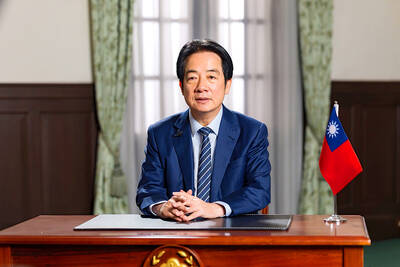The Money Shot Horns can make even grandma dance. That’s why they’ve been chosen as one of the headliners for tomorrow’s 2008 Taiwan Beer Festival (2008台灣啤酒節) in Wujih (烏日), Taichung County.
The event kicks off at 10:30am and features an appearance by the Taiwan Beer basketball team, food stalls, DJs, bartender shows, professional dancers, two Golden Melody Award-winning singers, and a massive graffiti installation that took two artists weeks to complete. The festival has already made stops in Tainan and Zhunan and will hit Taipei on Aug. 19, but the Taichung event is the largest and most heavily promoted.
Its aim is to promote the nightlife scene in the area around the Taiwan Beer Factory (烏日啤酒廠行政大樓前廣場) in Wujih, which is less than one kilometer from the Taiwan High Speed Rail Co’s Wujih Station and a 20-minute drive from downtown Taichung. Two restaurants have opened in the beer factory and several restaurants and nightspots will open soon nearby. The area is accessible from Taichung via the THSRC’s shuttle bus.
The main party starts at 5:30pm tomorrow with a bartender show, followed by music from DJ Edify, who spins funky house. A few dozen dancers will be on hand to create atmosphere and encourage the crowd to get down.
Hard-rock band Reload plays on the main stage at 6:30pm, while funk supergroup the Money Shot Horns takes to the stage at 7:45pm. Then it’s a triple bill of talented singers: Golden Melody Award-winning Puyuma songstress Jiajia (家家); Alin, who was recently discovered by an agent at the EZ5 club in Taitung; and, finally, Jeannie Hsieh (謝金燕), winner of the Best Taiwanese Female Singer gong at the 2007 Golden Melody Awards.
The Taiwan Beer Factory in Wujih (烏日啤酒廠行政大樓前廣場) is located at 1 Guanghua Rd, Wujih, Taichung County (台中縣烏日鄉光華街一號). The festival runs from 10:30am to 9:30pm.

This month the government ordered a one-year block of Xiaohongshu (小紅書) or Rednote, a Chinese social media platform with more than 3 million users in Taiwan. The government pointed to widespread fraud activity on the platform, along with cybersecurity failures. Officials said that they had reached out to the company and asked it to change. However, they received no response. The pro-China parties, the Chinese Nationalist Party (KMT) and Taiwan People’s Party (TPP), immediately swung into action, denouncing the ban as an attack on free speech. This “free speech” claim was then echoed by the People’s Republic of China (PRC),

Exceptions to the rule are sometimes revealing. For a brief few years, there was an emerging ideological split between the Democratic Progressive Party (DPP) and Chinese Nationalist Party (KMT) that appeared to be pushing the DPP in a direction that would be considered more liberal, and the KMT more conservative. In the previous column, “The KMT-DPP’s bureaucrat-led developmental state” (Dec. 11, page 12), we examined how Taiwan’s democratic system developed, and how both the two main parties largely accepted a similar consensus on how Taiwan should be run domestically and did not split along the left-right lines more familiar in

Many people in Taiwan first learned about universal basic income (UBI) — the idea that the government should provide regular, no-strings-attached payments to each citizen — in 2019. While seeking the Democratic nomination for the 2020 US presidential election, Andrew Yang, a politician of Taiwanese descent, said that, if elected, he’d institute a UBI of US$1,000 per month to “get the economic boot off of people’s throats, allowing them to lift their heads up, breathe, and get excited for the future.” His campaign petered out, but the concept of UBI hasn’t gone away. Throughout the industrialized world, there are fears that

The Democratic Progressive Party (DPP) controlled Executive Yuan (often called the Cabinet) finally fired back at the opposition-controlled Legislative Yuan in their ongoing struggle for control. The opposition Chinese Nationalist Party (KMT) and Taiwan People’s Party (TPP) acted surprised and outraged, but they should have seen it coming. Taiwan is now in a full-blown constitutional crisis. There are still peaceful ways out of this conflict, but with the KMT and TPP leadership in the hands of hardliners and the DPP having lost all patience, there is an alarming chance things could spiral out of control, threatening Taiwan’s democracy. This is no